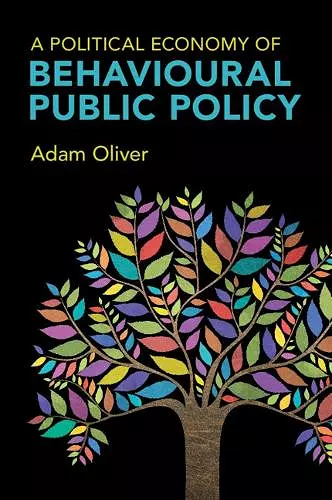A Political Economy of Behavioural Public Policy
Format:Paperback
Publisher:Cambridge University Press
Published:23rd Feb '23
Currently unavailable, and unfortunately no date known when it will be back
This paperback is available in another edition too:
- Hardback£70.00(9781009282567)

An overarching liberal political economy of behavioural public policy, offering a radical departure from existing paternalistic frameworks.
The book is invaluable to all those interested in behavioural science and its application to policy. It offers a unique framework that fits within the classical liberal tradition of affording citizens autonomy over their lives, so long as they do not abuse that freedom by imposing substantive harms on others.Behavioural public policy has thus far been dominated by approaches that are based on the premise that it is entirely legitimate for policymakers to design policies that nudge or influence people to avoid desires that may not be in their own self- interest. This book argues, instead, for a liberal political economy that radically departs from these paternalistic frameworks. Oliver argues for a framework whereby those who impose no substantive harms on others ought to be free of manipulative or coercive interference. On this view, BPP does not seek to “correct” an individual's conception of the desired life. This book is the third in a trilogy of books by Adam Oliver on the origins and conceptual foundations of BPP.
'A Political Economy of Behavioural Public Policy is packed with insights regarding the role of government. Adam Oliver's concerns with the role of reciprocity in human life take behavioural economics one step further. In his new version of political liberalism, ideally, governments free people to adopt their own views regarding how they can contribute to the happiness of others - and, as a by-product, they get a sense of worth from making such a contribution.' George Akerlof, Nobel Laureate in Economics, 2001
'Adam Oliver's newest book, the coda to his trilogy, is essential reading for everyone interested in the political economy of behavioural public policy. Though rooted in classical liberalism, it articulates a coherent argument for limited government regulation to curb abuses of autonomy by those who would selfishly impose behaviourally informed harms on others, rather than to 'correct' behaviorally influenced choices. The book rewards readers with Oliver's insightful and provocative perspective.' B. Douglas Bernheim, Stanford University
'Essential reading for anyone eager to delve deeper into the realm of behavioural public policy.' Olga Danylenko, LSE Review of Books
ISBN: 9781009282550
Dimensions: 228mm x 152mm x 12mm
Weight: 360g
250 pages